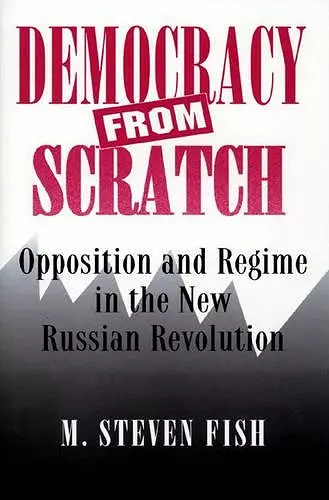Democracy from Scratch
Opposition and Regime in the New Russian Revolution
Format:Paperback
Publisher:Princeton University Press
Published:29th Aug '96
Should be back in stock very soon

[Democracy from Scratch] will doubtless become a standard in the field... Among its fine attributes are its solid grounding in comparative political theory, its conceptual originality, its richness of information, and the sound interpretations that prevade it. -- Michael Urban, University of California, Santa Cruz
Presents a fresh view of Russian political change in the Gorbachev and early post-Soviet periods not by examining perestroika and glasnost in and of themselves, but by investigating the autonomous political organizations that responded to liberalization. This book proposes a novel and theoretical way to study Russian politics.This book presents a fresh view of Russian political change in the Gorbachev and early post-Soviet periods not by examining perestroika and glasnost in and of themselves, but by investigating the autonomous political organizations that responded to liberalization. Extensive study of these political groups, in Moscow and several provincial cities, has led M. Steven Fish to conclude that they were shaped to a far greater degree by the nature of the Soviet state than by socioeconomic modernization, political culture, native psychology, or Russian historical tradition. Fish's statist theory of societal change in Russia yields a powerful explanation of why Russia's new political society differs radically not only from the "totalized," sub-jugated country of the pre-1985 period but also from the "civil societies" found in the West and in many developing countries. In addition, the author shows how the legacy of the Soviet experience continues to influence the development--arguably the underdevelopment--of representative political institutions in post-Soviet Russia, making the establishment of stable democracy unlikely in the near term. This book proposes a novel and theoretically sophisticated way to study Russian politics. It offers a rigorous approach to understanding social movements, political party formation, regime change, and democratization in general. While focusing primarily on a single country, it is vigorously comparative at the same time.
"An intelligent, subtle, first-hand account of the years after Gorbachev opened the door with perestroika."--Foreign Affairs "An original and provocative study...Drawing on his scrupulous analysis of group-formation in a number of Russian cities,...Fish reevaluates received views about the Soviet system."--Robert Shannan Peckham, New Statesman & Society "A detailed, on-the-spot investigation of the new political parties and movements that sprang up between Gorbachev's initiation of semi-free elections in 1989 and the August 1991 coup... It conveys a fascinating picture, however, of the fumbling and bumbling by would-be democratic leaders when the window of opportunity opened."--Robert V. Daniels, The New Leader "The book is an important contribution to our understanding of the disorganized hyperactivity of political organizations in Russia."--Choice "A smart book that speaks to the concerns not only of area specialists but to students of democratic transition around the world."--Philip G. Roeder, Political Science Quarterly
ISBN: 9780691029146
Dimensions: unknown
Weight: 454g
312 pages